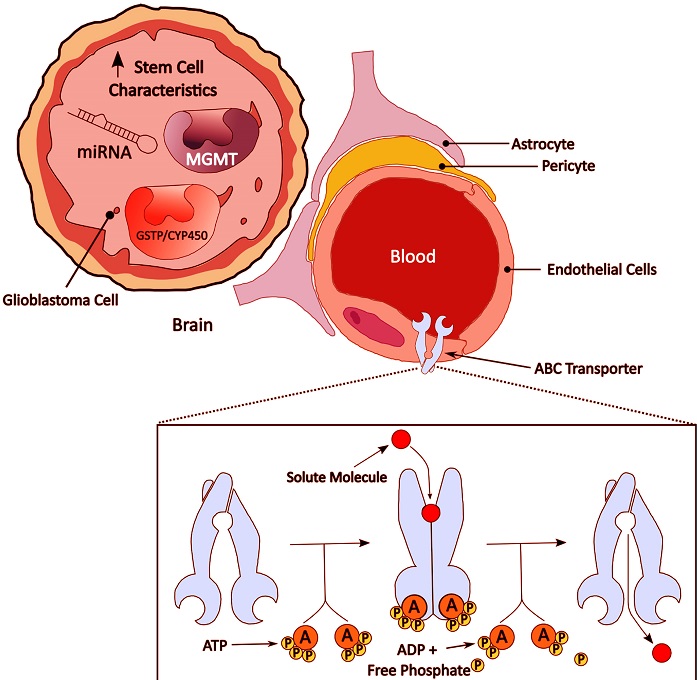Malaysian and Australian Oncologists Explore ABC Transporters and Their Role in Glioblastoma Drug Resistance
Nikhil Prasad Fact checked by:Thailand Medical News Team Jan 19, 2025 11 months, 5 days, 7 hours, 58 minutes ago
Medical News: Understanding Glioblastoma and Drug Resistance Glioblastoma (GBM) remains one of the most aggressive and difficult-to-treat brain cancers. Despite extensive research and advances in medicine, treatment options have seen limited success, with most therapies extending survival by only a few months. One of the key factors contributing to this challenge is the phenomenon of drug resistance, a major hurdle in cancer treatment.
 Malaysian and Australian Oncologists Explore ABC Transporters and Their Role in Glioblastoma Drug Resistance
Malaysian and Australian Oncologists Explore ABC Transporters and Their Role in Glioblastoma Drug Resistance
Drug resistance in GBM is linked to a variety of mechanisms, but one significant player has been identified: the ATP-binding cassette (ABC) transporters. These proteins are responsible for pumping out chemotherapeutic drugs from cancer cells, reducing their effectiveness. Understanding how these transporters operate and finding ways to inhibit them could pave the way for more effective treatments for GBM patients.
ABC Transporters: The Culprits Behind Drug Resistance
ABC transporters are a family of proteins that use energy from ATP to move substances across cell membranes. In cancer cells, these transporters play a crucial role in drug resistance by expelling therapeutic drugs before they can take effect. This
Medical News report focuses on their role in glioblastoma and the implications for future treatments.
Researchers from the Jeffrey Cheah School of Medicine and Health Sciences at Monash University Malaysia, in collaboration with the Department of Biochemistry and Molecular Biology at Monash University Melbourne, have provided a comprehensive review of how these transporters contribute to drug resistance in GBM. They systematically analyzed data from 16 studies to better understand the impact of ABC transporters on various anticancer drugs.
Key Findings of the Study
One of the most striking findings was the role of specific ABC transporters, such as ABCB1, ABCA13, and ABCB9, in promoting drug resistance. The researchers highlighted how these transporters were associated with poor patient outcomes, including reduced survival rates. For instance, high levels of ABCA13 and ABCB9 were identified as independent negative prognostic factors for GBM patients. In contrast, certain interventions targeting these transporters significantly improved the efficacy of chemotherapeutic drugs.
Temozolomide (TMZ), a common chemotherapy drug for GBM, was a central focus of the study. The researchers found that inhibiting transporters like ABCB1 enhanced the drug’s effectiveness. In lab settings, introducing specific inhibitors or genetic modifications led to increased drug accumulation in cancer cells, resulting in higher rates of cell death. This pattern was also observed with other drugs such as carmustine, irinotecan, and doxorubicin.
Advancements in Understanding Drug Resistance Mechanisms
The study delved deep into the molecular pathways that regulate ABC transporter expression. For instance, the PI3K/Akt/NF-&
amp;kappa;B pathway was identified as a significant contributor to transporter activation. By targeting this pathway, researchers believe it may be possible to suppress transporter activity and enhance drug efficacy.
Additionally, the role of the tumor microenvironment in influencing ABC transporter activity was emphasized. Hypoxic conditions within GBM tumors were found to increase the expression of certain transporters, further complicating treatment efforts. Strategies to counteract these effects, such as targeting hypoxia-induced factors like HIF-1α, were discussed as promising approaches.
Potential Solutions and Future Directions
While ABC transporters pose a significant challenge, the study outlined several strategies to overcome this obstacle. One promising approach involves using ABC transporter inhibitors in combination with existing chemotherapy drugs. Although early attempts to implement this strategy faced issues such as toxicity, newer methods hold promise.
Gene-editing technologies, like CRISPR-Cas9, were also highlighted as potential tools for directly targeting and silencing transporter genes. Similarly, the use of microRNAs to downregulate transporter expression presents an exciting avenue for research. These genetic approaches could provide a more precise and less toxic way to combat drug resistance in GBM.
Clinical Implications and Conclusions
The findings from this review underscore the importance of addressing ABC transporters in the fight against glioblastoma. By inhibiting these transporters, it may be possible to enhance the effectiveness of chemotherapy and improve patient outcomes. The study also highlights the need for a multifaceted approach that combines molecular, genetic, and pharmacological strategies to tackle drug resistance.
In conclusion, glioblastoma remains a formidable opponent in the field of oncology. However, advancements in our understanding of drug resistance mechanisms, particularly the role of ABC transporters, offer a glimmer of hope. By continuing to explore innovative solutions and refining existing therapies, researchers aim to develop more effective treatments for this devastating disease.
The study findings were published in the peer-reviewed journal: Pharmaceuticals.
https://www.mdpi.com/1424-8247/18/1/102
For the latest on Glioblastoma, keep on logging to Thailand
Medical News.
Read Also:
https://www.thailandmedical.news/news/doctors-warn-of-rising-cases-of-glioblastoma-multiforme-in-the-united-states
https://www.thailandmedical.news/news/understanding-glioblastoma-recurrence-and-survival
https://www.thailandmedical.news/news/exploring-natural-compounds-derived-from-peruvian-maca-lepidium-meyenii-to-tackle-glioblastoma-multiforme
https://www.thailandmedical.news/news/breaking-texas-md-anderson-study-finds-that-covid-19-accelerates-brain-tumor-progression-and-possibly-causes-new-onset-glioblastomas
https://www.thailandmedical.news/news/breaking-covid-19-news-study-finds-that-covid-19-hospitalization-linked-to-elevated-glioblastoma-risk-a-type-of-aggressive-brain-cancer
https://www.thailandmedical.news/news/citrus-peel-oils-as-potential-game-changers-in-brain-cancer-therapy
